人教版八年级下册Unit 8 Have you read Treasure Island yet?SectionA Grammar Focus (4a~4c)课件(共18张PPT)
文档属性
| 名称 | 人教版八年级下册Unit 8 Have you read Treasure Island yet?SectionA Grammar Focus (4a~4c)课件(共18张PPT) | 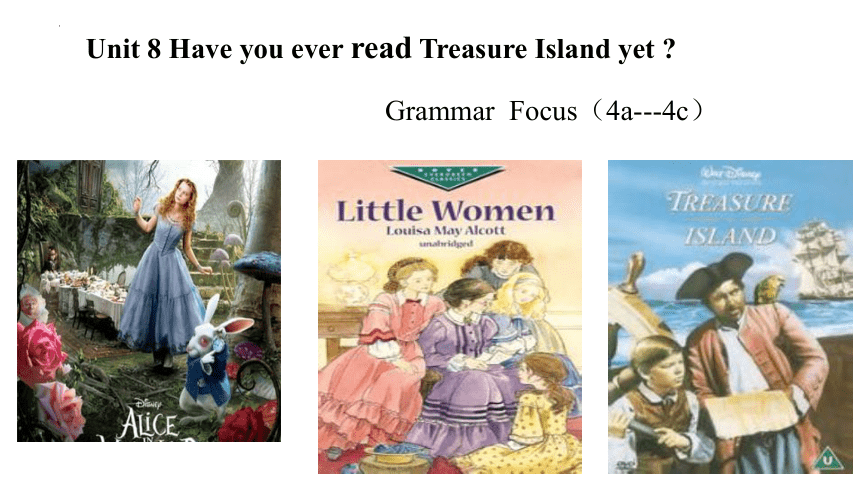 | |
| 格式 | pptx | ||
| 文件大小 | 437.0KB | ||
| 资源类型 | 教案 | ||
| 版本资源 | 人教新目标(Go for it)版 | ||
| 科目 | 英语 | ||
| 更新时间 | 2024-09-29 13:35:36 | ||
图片预览

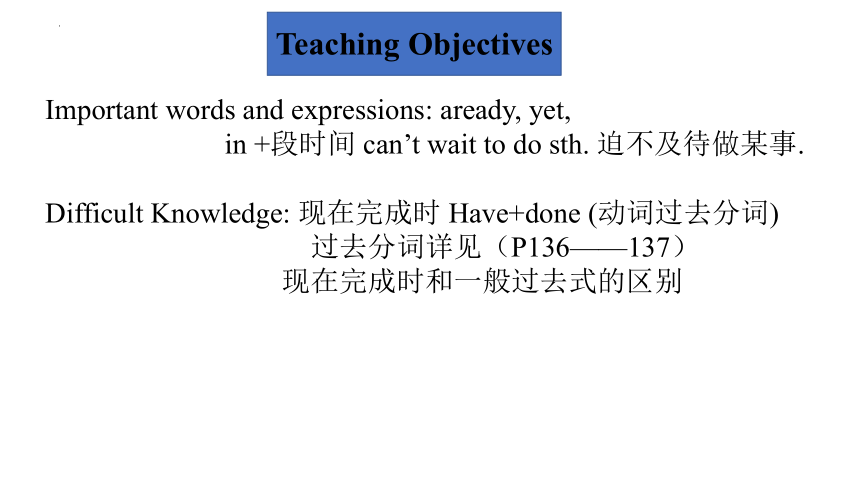
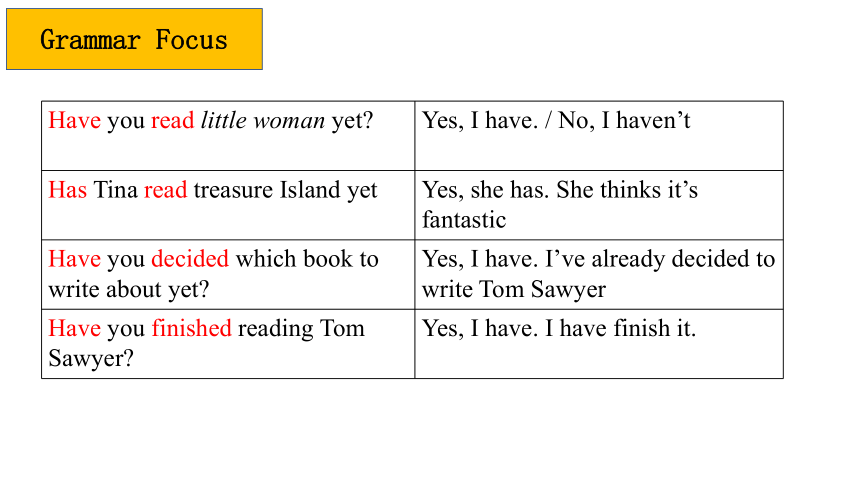
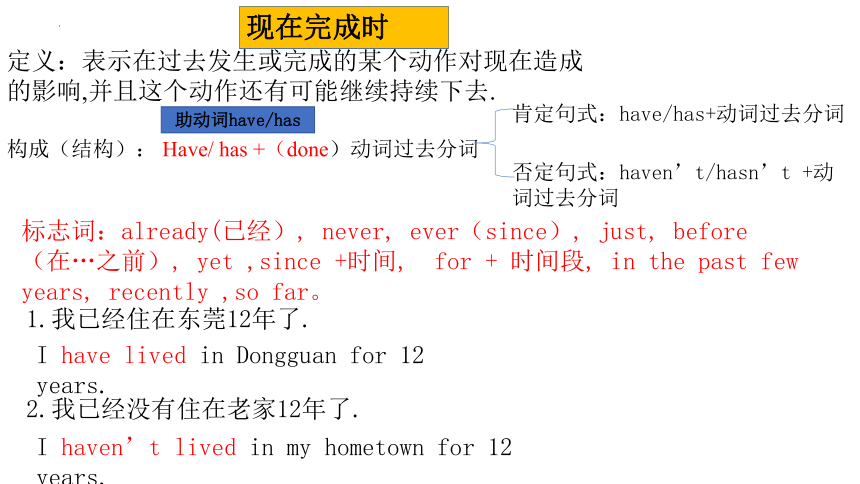
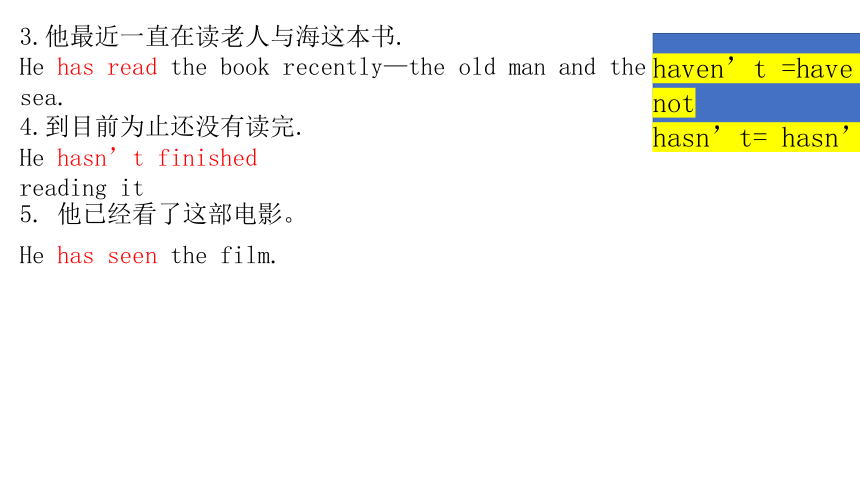
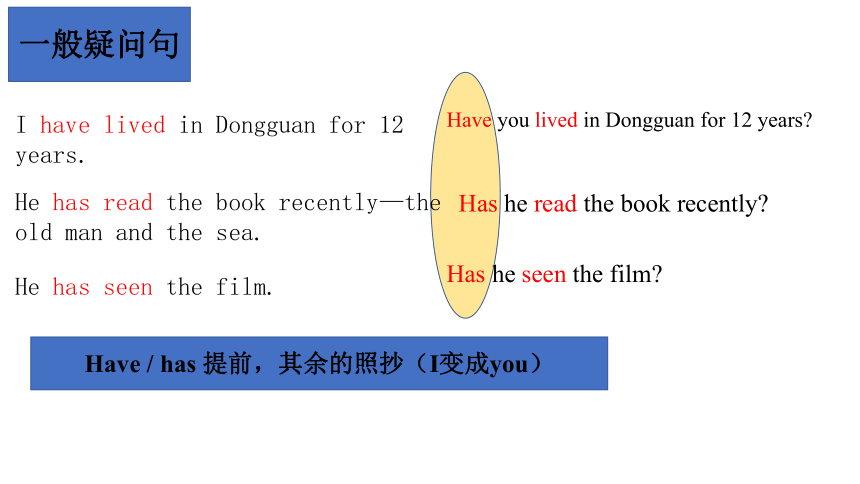
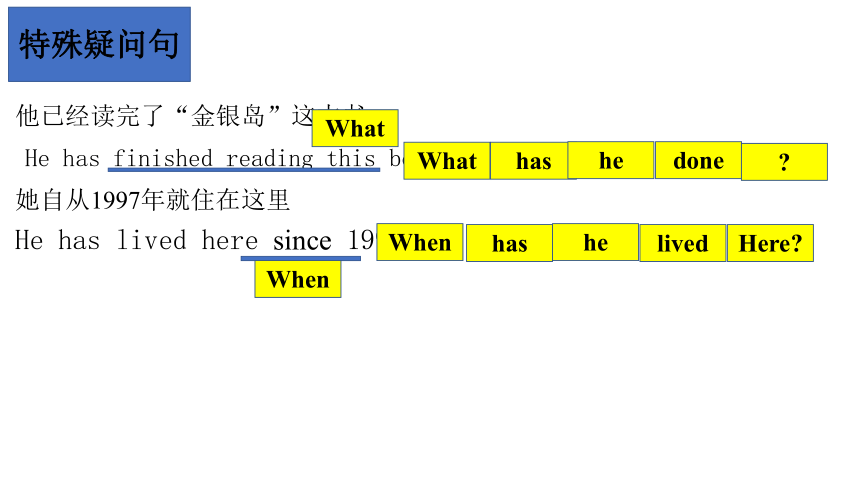
文档简介
(共18张PPT)
Unit 8 Have you ever read Treasure Island yet
Grammar Focus(4a---4c)
Teaching Objectives
Important words and expressions: aready, yet,
in +段时间 can’t wait to do sth. 迫不及待做某事.
Difficult Knowledge: 现在完成时 Have+done (动词过去分词)
过去分词详见(P136——137)
现在完成时和一般过去式的区别
Have you read little woman yet Yes, I have. / No, I haven’t
Has Tina read treasure Island yet Yes, she has. She thinks it’s fantastic
Have you decided which book to write about yet Yes, I have. I’ve already decided to write Tom Sawyer
Have you finished reading Tom Sawyer Yes, I have. I have finish it.
Grammar Focus
定义:表示在过去发生或完成的某个动作对现在造成 的影响,并且这个动作还有可能继续持续下去.
构成(结构): Have/ has +(done)动词过去分词
肯定句式:have/has+动词过去分词
否定句式:haven’t/hasn’t +动词过去分词
标志词:already(已经), never, ever(since), just, before(在…之前), yet ,since +时间, for + 时间段, in the past few years, recently ,so far。
助动词have/has
1.我已经住在东莞12年了.
2.我已经没有住在老家12年了.
I have lived in Dongguan for 12 years.
I haven’t lived in my hometown for 12 years.
现在完成时
3.他最近一直在读老人与海这本书.
4.到目前为止还没有读完.
He has read the book recently—the old man and the sea.
He hasn’t finished reading it
haven’t =have not
hasn’t= hasn’t
5. 他已经看了这部电影。
He has seen the film.
一般疑问句
I have lived in Dongguan for 12 years.
He has read the book recently—the old man and the sea.
He has seen the film.
Have you lived in Dongguan for 12 years
Has he read the book recently
Has he seen the film
Have / has 提前,其余的照抄(I变成you)
特殊疑问句
他已经读完了“金银岛”这本书
He has finished reading this book.
她自从1997年就住在这里
He has lived here since 1997.
What
What
has
he
done
When
When
has
he
lived
Here
过去分词
过去分词规则变法
1.一般在动词词尾直接加ed
finish—finished call——called pick——picked
2.以不发音字母e结尾的动词后面加d
decide——decided love——loved like——liked
3. 以“辅音字母+y”结尾的动词, 变y为i, 再加-ed.
study——studied hurry——hurried reply——replied
4.词尾只有一个辅音字母的重读闭音节动词,要双写辅音字母,再加-ed.
Stop ——stopped ——stopped clap——clapped——clapped
过去分词不规则变法(P136——P137)
过去分词
1.AAA
cost—cost—cost cut—cut—cut hit—hit—hit hurt—hurt-hurt
let—let—let put—put—put read—read—read set—set—set shut—shut—shut spread—spread—spread
2.ABB
build—built built burn—burnt—burnt buy—bought—bought
catch—caught—caught dig—dug—dug feed—fed—fed feel—felt—felt fight—fought—fought find—found—found
hang—hung—hung have—had—had hear—heard—heard
hold—held—held keep—kept—
1.我已经见到了我们的的新老师.
______________________________________________________
2. I have already seen our new teacher.(改为否定句)
I ________ ________ our new teacher ________.
2. I have already finished reading Journey to the West. (对画线部分提问)
______ ______ ______ _________reading yet
3. Jane has already read Little Women.(改为一般疑问句)
________ Jane ________ Little Women yet
4. —Have they finished their work?(作否定回答)
—________,they ________.
5. Did you visit the zoo?(用现在完成时改写句子)
________ _______ ________ the zoo ________?
练习
We have already seen our new teacher.
haven’t
seen
yet
What
have
you
finish
Has
read
No
haven’t
Have
you
visited
yet
现在完成时和一般过去式的区别
现在完成时:表示在过去发生或完成的某个动作对现在造成 的影响,并且这个动作还有可能继续持续下去.
already(已经), never, ever(曾经), just, before(在…之前), yet ,since +时间, for + 时间段, in the past few years, recently ,so far.
1.我已经看了这部电影.
I have already seen this film.
一般过去式:表示过去发生的事情:
(yesterday, last month, last weekend, last year in2013,ago etc.)
2.我昨天看了这部电影
I saw this film yesterday
强调的是过去的动作对现在造成的影响或者联系
仅仅说的是过去这件事
3.他八年以前就一直住在这里.
He has lived here since 8 years ago.
4.他八年前住在这里.
He lived here 8 years ago.
强调的是过去的动作对现在造成的影响.他还有可能住下去
仅仅是“过去的住在这里,跟现在没有联系”
6:他们去了上海了.
5:他已经去上海了.
He has gone to Shanghai.
He went to shanghai.
强调现在去了上海
强调昨天或者以前去了上海.
1. —What did you do last night
—I ____TV and read books.
A. watch B. watched C. have watched
D. was watching
2. My brother and I ____in Nanning since1997.
A. was living B. have lived
C. live D. will live
练习
3. —That’s a nice mobile phone.
—So it is. My aunt ___it for me last birthday.
A. buy B. will buy
C. have bought D. bought
4. He promised to pick me up at the school gate. However, he ___yet.
A. didn’t arrive B. doesn’t arrive
C . isn’t arrive D. hasn’t arrived
1. A: Would you like something to drink
B: No, thanks. _______________________________________________________.
(just/drink some tea)
2. A: I heard you lost your key.
__________________________________________________________________ (find)
B: No, not yet.
A: When ____________________________________________________________ (leave)
B: This morning.
4. A: Is your sister going to the movies with us tonight
B: No. ________________________________________________________________ .
(already/see the film)
5. A: What do your parents think about our plan
B: I ___________________________________________________________________. (not/tell them/yet)
4a:Use the words in brackets to complete the conversations.
I’ve just drunk some tea.
Have you found your keys yet .
When did you leave
She has already seen the film.
I haven’t told them yet.
Sally ______ (love) reading. In the morning she reads the newspaper and in the evening she reads books. She ______ already ______ (read) more than 100 different books! Her favorite kind of books is science fiction. She is interested in science and technology and loves to imagine what the world ______ (be) like in 50 years. he ________ (finish) reading a book about robots last week and _________ (write) a book report about it next week for her French class. Every time she is in the library, Sally looks at the many books she __________ (not read) yet and she can’t wait to read them.
4b:Fill in the blanks with the correct
lovess
hass
reads
Will bes
finished
will writes
hasn’t read
4c:Complete the chart with information about you and a friend.
A: What books have you already read
B: I have already read Tom Sawyer and Harry Potter.
A: What do you think of them
B: Well, I think Harry Potter was exciting,
but Tom Sawyer was a bit boring.
现在完成时
用法
结构
标志词
过去发生的事情最现在产生的影响或结果
肯定: have +P.P(动词过去分词)
否定:haven’t/hasn’t +P.P(动词过去分词)
一般疑问句:have/has +主语
already, ever, yet, since, for
Summary(总结)
Unit 8 Have you ever read Treasure Island yet
Grammar Focus(4a---4c)
Teaching Objectives
Important words and expressions: aready, yet,
in +段时间 can’t wait to do sth. 迫不及待做某事.
Difficult Knowledge: 现在完成时 Have+done (动词过去分词)
过去分词详见(P136——137)
现在完成时和一般过去式的区别
Have you read little woman yet Yes, I have. / No, I haven’t
Has Tina read treasure Island yet Yes, she has. She thinks it’s fantastic
Have you decided which book to write about yet Yes, I have. I’ve already decided to write Tom Sawyer
Have you finished reading Tom Sawyer Yes, I have. I have finish it.
Grammar Focus
定义:表示在过去发生或完成的某个动作对现在造成 的影响,并且这个动作还有可能继续持续下去.
构成(结构): Have/ has +(done)动词过去分词
肯定句式:have/has+动词过去分词
否定句式:haven’t/hasn’t +动词过去分词
标志词:already(已经), never, ever(since), just, before(在…之前), yet ,since +时间, for + 时间段, in the past few years, recently ,so far。
助动词have/has
1.我已经住在东莞12年了.
2.我已经没有住在老家12年了.
I have lived in Dongguan for 12 years.
I haven’t lived in my hometown for 12 years.
现在完成时
3.他最近一直在读老人与海这本书.
4.到目前为止还没有读完.
He has read the book recently—the old man and the sea.
He hasn’t finished reading it
haven’t =have not
hasn’t= hasn’t
5. 他已经看了这部电影。
He has seen the film.
一般疑问句
I have lived in Dongguan for 12 years.
He has read the book recently—the old man and the sea.
He has seen the film.
Have you lived in Dongguan for 12 years
Has he read the book recently
Has he seen the film
Have / has 提前,其余的照抄(I变成you)
特殊疑问句
他已经读完了“金银岛”这本书
He has finished reading this book.
她自从1997年就住在这里
He has lived here since 1997.
What
What
has
he
done
When
When
has
he
lived
Here
过去分词
过去分词规则变法
1.一般在动词词尾直接加ed
finish—finished call——called pick——picked
2.以不发音字母e结尾的动词后面加d
decide——decided love——loved like——liked
3. 以“辅音字母+y”结尾的动词, 变y为i, 再加-ed.
study——studied hurry——hurried reply——replied
4.词尾只有一个辅音字母的重读闭音节动词,要双写辅音字母,再加-ed.
Stop ——stopped ——stopped clap——clapped——clapped
过去分词不规则变法(P136——P137)
过去分词
1.AAA
cost—cost—cost cut—cut—cut hit—hit—hit hurt—hurt-hurt
let—let—let put—put—put read—read—read set—set—set shut—shut—shut spread—spread—spread
2.ABB
build—built built burn—burnt—burnt buy—bought—bought
catch—caught—caught dig—dug—dug feed—fed—fed feel—felt—felt fight—fought—fought find—found—found
hang—hung—hung have—had—had hear—heard—heard
hold—held—held keep—kept—
1.我已经见到了我们的的新老师.
______________________________________________________
2. I have already seen our new teacher.(改为否定句)
I ________ ________ our new teacher ________.
2. I have already finished reading Journey to the West. (对画线部分提问)
______ ______ ______ _________reading yet
3. Jane has already read Little Women.(改为一般疑问句)
________ Jane ________ Little Women yet
4. —Have they finished their work?(作否定回答)
—________,they ________.
5. Did you visit the zoo?(用现在完成时改写句子)
________ _______ ________ the zoo ________?
练习
We have already seen our new teacher.
haven’t
seen
yet
What
have
you
finish
Has
read
No
haven’t
Have
you
visited
yet
现在完成时和一般过去式的区别
现在完成时:表示在过去发生或完成的某个动作对现在造成 的影响,并且这个动作还有可能继续持续下去.
already(已经), never, ever(曾经), just, before(在…之前), yet ,since +时间, for + 时间段, in the past few years, recently ,so far.
1.我已经看了这部电影.
I have already seen this film.
一般过去式:表示过去发生的事情:
(yesterday, last month, last weekend, last year in2013,ago etc.)
2.我昨天看了这部电影
I saw this film yesterday
强调的是过去的动作对现在造成的影响或者联系
仅仅说的是过去这件事
3.他八年以前就一直住在这里.
He has lived here since 8 years ago.
4.他八年前住在这里.
He lived here 8 years ago.
强调的是过去的动作对现在造成的影响.他还有可能住下去
仅仅是“过去的住在这里,跟现在没有联系”
6:他们去了上海了.
5:他已经去上海了.
He has gone to Shanghai.
He went to shanghai.
强调现在去了上海
强调昨天或者以前去了上海.
1. —What did you do last night
—I ____TV and read books.
A. watch B. watched C. have watched
D. was watching
2. My brother and I ____in Nanning since1997.
A. was living B. have lived
C. live D. will live
练习
3. —That’s a nice mobile phone.
—So it is. My aunt ___it for me last birthday.
A. buy B. will buy
C. have bought D. bought
4. He promised to pick me up at the school gate. However, he ___yet.
A. didn’t arrive B. doesn’t arrive
C . isn’t arrive D. hasn’t arrived
1. A: Would you like something to drink
B: No, thanks. _______________________________________________________.
(just/drink some tea)
2. A: I heard you lost your key.
__________________________________________________________________ (find)
B: No, not yet.
A: When ____________________________________________________________ (leave)
B: This morning.
4. A: Is your sister going to the movies with us tonight
B: No. ________________________________________________________________ .
(already/see the film)
5. A: What do your parents think about our plan
B: I ___________________________________________________________________. (not/tell them/yet)
4a:Use the words in brackets to complete the conversations.
I’ve just drunk some tea.
Have you found your keys yet .
When did you leave
She has already seen the film.
I haven’t told them yet.
Sally ______ (love) reading. In the morning she reads the newspaper and in the evening she reads books. She ______ already ______ (read) more than 100 different books! Her favorite kind of books is science fiction. She is interested in science and technology and loves to imagine what the world ______ (be) like in 50 years. he ________ (finish) reading a book about robots last week and _________ (write) a book report about it next week for her French class. Every time she is in the library, Sally looks at the many books she __________ (not read) yet and she can’t wait to read them.
4b:Fill in the blanks with the correct
lovess
hass
reads
Will bes
finished
will writes
hasn’t read
4c:Complete the chart with information about you and a friend.
A: What books have you already read
B: I have already read Tom Sawyer and Harry Potter.
A: What do you think of them
B: Well, I think Harry Potter was exciting,
but Tom Sawyer was a bit boring.
现在完成时
用法
结构
标志词
过去发生的事情最现在产生的影响或结果
肯定: have +P.P(动词过去分词)
否定:haven’t/hasn’t +P.P(动词过去分词)
一般疑问句:have/has +主语
already, ever, yet, since, for
Summary(总结)
同课章节目录
- Unit 1 What's the matter?
- Section A
- Section B
- Unit 2 I'll help to clean up the city parks.
- Section A
- Section B
- Unit 3 Could you please clean your room?
- Section A
- Section B
- Unit 4 Why don't you talk to your parents?
- Section A
- Section B
- Unit 5 What were you doing when the rainstorm came
- Section A
- Section B
- Review of Units 1-5
- Unit 6 An old man tried to move the mountains.
- Section A
- Section B
- Unit 7 What's the highest mountain in the world?
- Section A
- Section B
- Unit 8 Have you read Treasure Island yet?
- Section A
- Section B
- Unit 9 Have you ever been to a museum?
- Section A
- Section B
- Unit 10 I've had this bike for three years.
- Section A
- Section B
